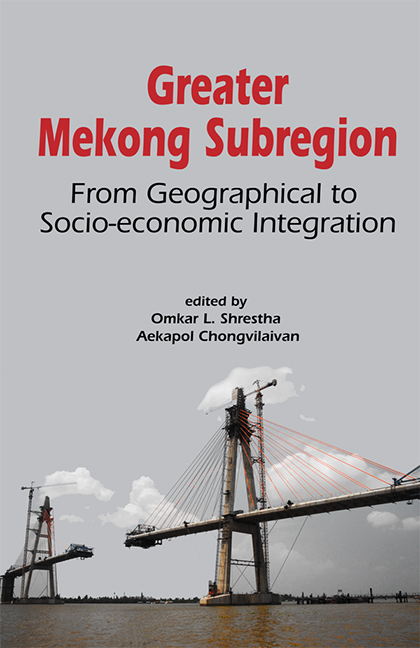Book contents
- Frontmatter
- Contents
- Preface
- List of Abbreviations
- Contributors
- 1 Greater Mekong Subregion: From Geographical Corridors to Socio-economic Corridors
- 2 Cambodia, Its Development, and Integration into the GMS: A Work in Progress
- 3 Subregional Connectivity in the Lao PDR: From Land-locked Disadvantage to Land-linked Advantage
- 4 The Economic Development of Myanmar and the Relevance of the Greater Mekong Subregion
- 5 GMS Challenges for Thailand
- 6 Deepening GMS Cooperation in a More Integrated ASEAN and East Asia
- 7 China (Yunnan)–GMS Economic Cooperation: New Development and New Problems
- 8 Trade and Investment in the Greater Mekong Subregion: Remaining Challenges and the Unfinished Policy Agenda
- 9 Enhancing Financial Cooperation among the GMS Countries
- 10 The Challenges of GMS Regional Integration: Case Study of Governance of the Logistics Industry in Thailand
- 11 Energy Sector Integration for Low-carbon Development in the GMS: Towards a Model of South-South Cooperation
- 12 Linking the Social to the Economic: Broadened Ambitions and Multiple Mitigations in New Mekong Corridors
- Index
5 - GMS Challenges for Thailand
Published online by Cambridge University Press: 21 October 2015
- Frontmatter
- Contents
- Preface
- List of Abbreviations
- Contributors
- 1 Greater Mekong Subregion: From Geographical Corridors to Socio-economic Corridors
- 2 Cambodia, Its Development, and Integration into the GMS: A Work in Progress
- 3 Subregional Connectivity in the Lao PDR: From Land-locked Disadvantage to Land-linked Advantage
- 4 The Economic Development of Myanmar and the Relevance of the Greater Mekong Subregion
- 5 GMS Challenges for Thailand
- 6 Deepening GMS Cooperation in a More Integrated ASEAN and East Asia
- 7 China (Yunnan)–GMS Economic Cooperation: New Development and New Problems
- 8 Trade and Investment in the Greater Mekong Subregion: Remaining Challenges and the Unfinished Policy Agenda
- 9 Enhancing Financial Cooperation among the GMS Countries
- 10 The Challenges of GMS Regional Integration: Case Study of Governance of the Logistics Industry in Thailand
- 11 Energy Sector Integration for Low-carbon Development in the GMS: Towards a Model of South-South Cooperation
- 12 Linking the Social to the Economic: Broadened Ambitions and Multiple Mitigations in New Mekong Corridors
- Index
Summary
The Association of Southeast Asian Nations (ASEAN) has progressed a lot and so has the Asia-Pacific Economic Cooperation (APEC), in terms of economic cooperation. Now we are moving on Greater Mekong Subregion (GMS) economic cooperation. The GMS started later than ASEAN and APEC, but it is catching up very quickly. Discussing the issues concerning GMS economic cooperation is therefore very timely.
This chapter is about the GMS from the perspective of Thailand. In order to understand the GMS we need to look at it from the perspective of different countries because they are different, and their perspectives need to be taken into consideration to promote the GMS.
Firstly, it is useful to go back a little in history — into the socio-political history of the GMS. It is important to understand this in order to appreciate how we see things differently. I will talk a bit about the diversity of the GMS and the attempts at connectivity. I will share with you my views of what Thailand thinks of the GMS and what it wants to do about the GMS.
I have been trying to come up with a phrase to capture my sentiment about the GMS. For the time being this phrase is — “from the same beginning, through different means, towards the same end”. And that end is prosperity for the people in the area.
We can go as far back in history as we want, but what is important is our development just before and after the colonial period. I use the arrival of the Portuguese in Malacca before the sixteenth century as the beginning of the colonial era. At the time, Thailand was Siam, which was really a cultural entity — not an ethnic one — consisting of three major ethnic groups, viz., Thai-Lao, Mon-Khmer, and Java-Malay. We also had influences from China and India. This is obvious — two big countries next to us — there are lots of things we practise in Thailand that are of Indian or Chinese origin.
In the early colonial era, the Portuguese arrived in 1511, followed by the Spanish, the French, the Dutch, and later the British. During this early colonial period, Siam and the CMLV countries (Cambodia, Lao PDR, Myanmar, and Vietnam) were safe from colonization.
- Type
- Chapter
- Information
- Greater Mekong SubregionFrom Geographical to Socio-economic Integration, pp. 74 - 83Publisher: ISEAS–Yusof Ishak InstitutePrint publication year: 2013

